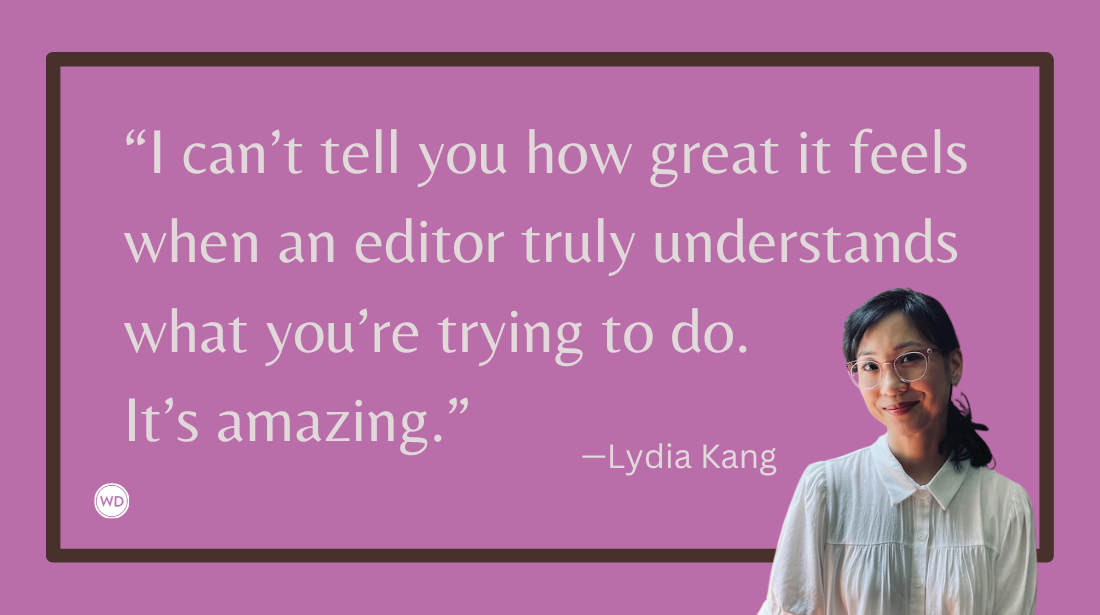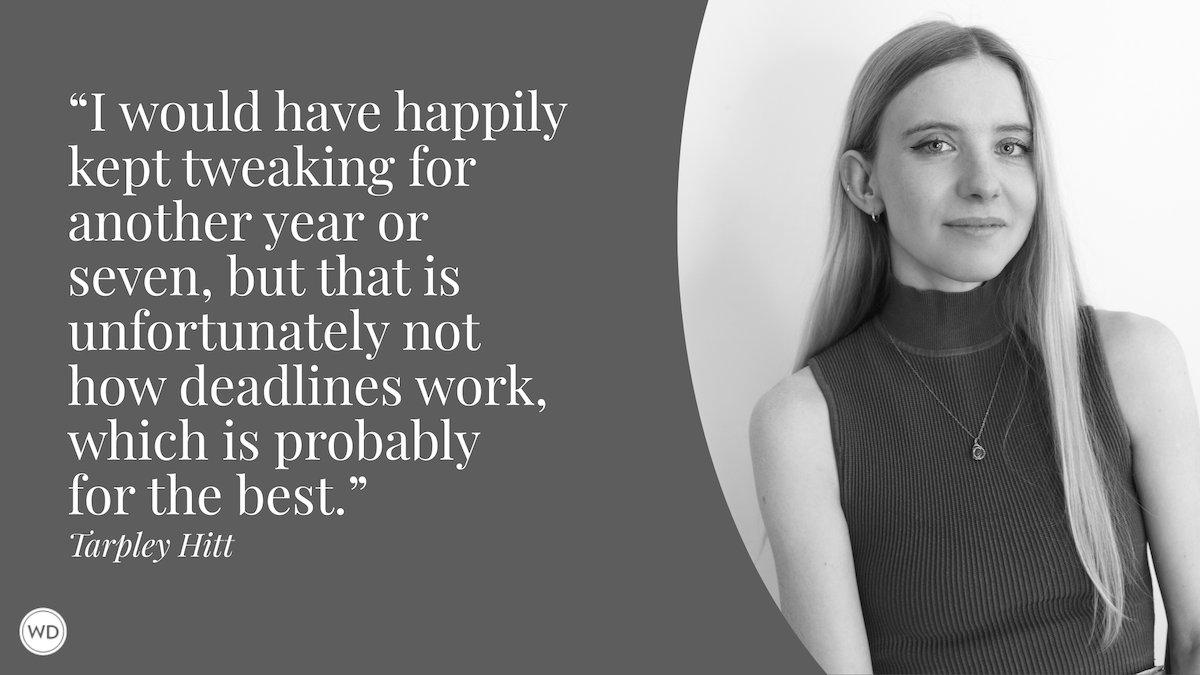How to Edit and Polish Your Writing
Most manuscripts start out a little messy. Try these thoughtful approaches to polishing your prose.
In Alphabet Juice, Roy Blount Jr.’s earthy, contrarian screed to the pleasures of language, he traces to Sir Arthur Quiller-Couch the now immortal edict of revision: Murder your darlings.*
It’s interesting that this advice, so often attributed to one great writer or another—Twain, Faulkner, Hemingway, Orwell, Auden, even Samuel Johnson—was in fact penned by a relative obscurity who’d be lost to posterity were it not for that one fierce, scolding admonition.
—by David Corbett
And yet, as Blount points out, the phrase “Murder your darlings” is itself, well, a darling. There are many less flashy ways Quiller-Couch could have issued his diktat: “Eliminate all words or phrases, no matter how pleasing, that draw undue attention to themselves (or the writer) at the expense of the narrative flow.”
But who would remember that?
Writing is rewriting, another pithy bon mot (per Eudora Welty), and one that shies away from the homicidal imagery. After all, you’re not out to flog your manuscript—or yourself—into a state of self-abnegation. You’re hoping to create an impression in the reader’s mind, one that forms clearly and flows naturally. You’re hoping for immediate comprehension and yet also a force of impact, a depth of meaning, or an aptness of expression that causes what’s been read to linger. You’re hoping to make the reader happy.
Notice that each one of those goals involves someone else: the reader. One of my favorite aunts used to say: “You don’t know yourself by yourself.” The writer’s corollary to this might be: The proof of your prose lies with the reader, not the writer.
Finding Good Help
Given that we revise to make our writing more pleasurable for the reader, why not include the reader in the housework?
The truth at the core of “murder your darlings” is that many a writer, smitten with a particularly lovely bit of writing, will ignore the fact that something’s not quite right about it. It says, “Look at me,” instead of, “Keep reading.” Readers catch this far more frequently than writers do, because their approach to the text is from the outside, whereas the author’s is from within.
However you can manage it, through writing groups, conferences, friends or colleagues, try to develop a trusting relationship with a reader whose instincts you respect, and who will be willing to be candid with you. That is, someone who wants and expects you to be brilliant, but who is also willing and able to hurt your feelings if necessary. You may not take every criticism to heart, but you need to learn to respect the reasonable expectations and judgments of the readers you’re setting out to reach.
If an objective reader isn’t available, you can and should try to train yourself to read your own work as a disinterested party, but it’s not as easy as it sounds. We automatically imbue the text with intentions we’ve brought to it—we know what lies “behind the words”—rather than taking those words at face value, as we do with someone else’s work on first impression.
Sometimes putting a work aside for a time can help with objectivity, if the luxury of delay affords itself. Better yet: Read your work out loud. We tend to hear clumsy locutions, florid overwriting, flabby dialogue—as well as weak prose, poor pacing and other such sins—far better than we see them when reading.
Deep Cleaning
Aristotle believed that the skills that demonstrate a facility with language, such as style and characterization, are the easiest for young writers to master, and that only upon maturity do writers demonstrate command of the subtler techniques that lie beneath the surface of the text, such as structure. Regardless, it’s often the surface that’s easiest to fix, and a great many writers begin there with their rewrites, tuning up their phrases, tightening their sentences.
This is a mistake. It can too easily lead to what the author and writing instructor James N. Frey likens to “rearranging deck chairs on the Titanic.” A manuscript with deep flaws in its conception of character, execution of plot, or simple logic cannot be fixed with polished prose, and focusing on language if your manuscript possesses these deeper missteps is wasted effort.
To revise successfully, you have to know what you’re writing about, what your story is, your point, your premise, your theme, whatever you call it. You have to know what it is quivering inside the story that moves you, for that’s the thing you’re trying to share with the reader.
You often need to write through to a preliminary end to see this deep meaning remotely, let alone clearly. You may need to meander for a while to discover it; you may need to rethink certain passages or scenes to gain the more intimate understanding necessary to feel it deeply. But if you try to revise before this clarifies itself in your mind—or your heart—you can end up polishing doorknobs to empty rooms.
We live in an age of irony, when it sometimes seems that one can’t care too little. This is a death sentence for good writing. There’s nothing wrong with emotion or passion, as long as it’s tempered by insight. And what’s revision except tempering your prose through insight?
Once you know what it is in your text that compels you, you can better see the shape it needs to be to bring that impact home. You can see the inescapable beginning-middle-end of it, see if it concludes with a decisive act or a devastating moment of self-revelation, see the crucial decision that must be made—or is forsaken.
In short, revise the deepest, least visible aspects of your story first: character, story, premise, structure. Only then will the other techniques of revision be meaningful or helpful.
Uncovering Clutter
I personally often revise as I go, and wish I didn’t. It’s a bad habit I wish I could break, and I do it because it gives me confidence that the writing is strong enough to merit continuing. Sadly, this reveals more about my self-doubt than it does about the worth of what I’ve written.
Little by little I’ve gotten better at allowing myself to write badly in order to at least get something on the page, something I can come back to. This leads us to a crucial point: You can’t revise what you haven’t written.
John Lescroart tells aspiring writers that he works on his books in two stages. In the first, he wears his “genius hat,” and with that jaunty chapeau on his noggin he can do no wrong: Every scene is dramatic and taut, every line of dialogue sings, every joke is funny. Once he gets an entire first draft written, he takes off the genius hat and puts on his “critic’s hat.” Now he goes back and fixes all the missteps he so merrily ignored in writing the first draft.
When you’re ready to put on that second hat, try these two techniques:
Eliminating Excess: In The Writing Life, Annie Dillard discusses what she calls “the old one-two.” This is where a writer expresses something quite well, then follows up with a rephrasing, as though to convince himself (or the reader) he got it right.
Take, for example, this: He realized he’d sold her short, turned a blind eye to the shadow falling across her soul. He’d put his faith in her glamour and dismissed her vanity, smiled at her ambition but ignored her greed. Depending on context, this freight train of repetitious clauses could easily be reduced to: He’d sold her short. That touch of bitter irony says just enough, while leaving the reader intrigued.
Often writers do this kind of overwriting unthinkingly as they develop a rhythm while forging ahead. And there’s nothing wrong in allowing for that kind of excess—when you’re wearing the genius hat. But when you return to these lines wearing the critic’s hat, remember: Say it once, say it well, and move on.
A corollary to this rule might be stated as: Trust subtext.
Or, in the immortal words of Billie Holiday: “Don’t explain.”
A great deal of unnecessary effort is too often expended on trying to hammer the reader over the head with something you’ve already conveyed quite well.
Jokes you explain are never funny. Stories you explain are never interesting. The key is to provide enough so the reader feels engaged, but not so much she can feel you trying to control how she responds to the text. Few writing mistakes are as cringe-inducing as when the writer belabors the obvious or otherwise explains things tendentiously, or at unnecessary length. (“I love you,” she gushed warmly.) Remember: The reader is your helper, not a problem child. It’s never the case that she’s “too dumb to get it,” and without your elaboration she’d be lost. Rather, if you’ve written it well, explanation is superfluous.
Tidying Up: In scriptwriting software, one dangling word of dialogue can force a premature page break, costing the writer a significant bit of precious real estate on the page. This prompts many scriptwriters to go back and focus on the dangling words at the end of a sentence or a paragraph (known as orphans), in order to tighten that section so an entire line isn’t lost to a mere word or two.
I never would have thought this discipline could be so useful in tidying up my prose as it’s proved to be. Writing that I thought was lean and taut almost invariably saw further improvement if I had to find some way to make it even more so. The skills you learn in ridding your prose of orphans translate across the board, and the merciless pursuit of clear, tight prose will serve you well even after all the orphans are tidied and tucked in.
Filling in the Cracks
Not all revision reduces to cutting, obviously. The admonition “less is more” carries the implicit addendum: “unless it’s not enough.”
This requires an understanding of your strengths and weaknesses as a writer. Sometimes, where you’re weak—be it in setting, pacing, backstory—the text will seem lackluster, wanting. Here especially trusted readers—or an unerring ear—come in handy. They can feel the empty spaces better than you.
But it’s not true that you must master all or settle for nothing. Ballantine editor Mark Tavani urges his writers to “forget their weaknesses and attack their strengths.” No writer is skilled at everything, nor should he try to be, and each will bring his particular virtues to the page.
All writing, especially fiction, requires a bit of legerdemain in the form of indirection, calling the reader’s attention to this over here so they fail to notice the blatant defect over there. The solution to revising an underwritten piece is to first make sure you’ve exploited your strengths to the fullest. Once you feel secure in this, you may find that the empty places you thought were there no longer seem quite so lacking.
Underwriting is a form of writer’s block, and easily deserves an article entirely of its own. The cure, as mentioned earlier, is often to give yourself permission to write badly, so you at least have something to work with. Revising writing that needs even vast improvement is infinitely easier than scaling that forbidding rock face commonly known as the blank page.
Don’t Forget the Mirror
At every step of writing, it’s important to remember that words are a means to reveal, not something to hide behind. One of the great mistakes of writing is to think of it as a way to impress people in order to escape or obscure our own personal shortcomings. Even great writers are not immune to shame or dread or being caught with spinach between their teeth, and being published is no antidote to being human.
Or, put differently, we can’t substitute writing problems for personal problems. In fact, the one often arises from the other.
I often get lost in minutiae, for example, missing the forest for the trees, for the sake of crossing absolutely every T and dotting every I. This results from an obsession with “getting it right” so that I can’t be faulted, a legacy of a fault-finding home life and a school regime dictated by ruler-wielding nuns.
But I digress.
Knowing this about myself has proved immeasurably helpful in my revisions. I see where I’m overwriting from a misbegotten devotion to being thorough, when in fact restraint is necessary to lure the reader in. It’s an invaluable lesson that came only over time, with insight and attention to what I was doing in my life, as well as my writing on the page.
In my teaching I’ve encountered shy, reclusive introverts with a lovely prose style who avoid all conflict on the page—just as they shy away from it in life. I’ve had thinkers whose characters never get out of their own heads, and compulsive talkers whose dialogue is a jabbering onslaught of empty words.
We can’t help but be who we are on the page, and that’s a good thing, as is realizing that the skills necessary for improving our writing will serve us in our attempts to be better people. The point of all writing is to be clear and honest, and every story points toward an ending where the hero has the chance to be braver, wiser, more loving. With hope, we can do the same. If so, we’ll most likely be able to mark our progress on the page.
*********************************************************************************************************************************
Follow me on Twitter: @BrianKlems
Check out my humor book, Oh Boy, You're Having a Girl.
Sign up for my free weekly eNewsletter: WD Newsletter









